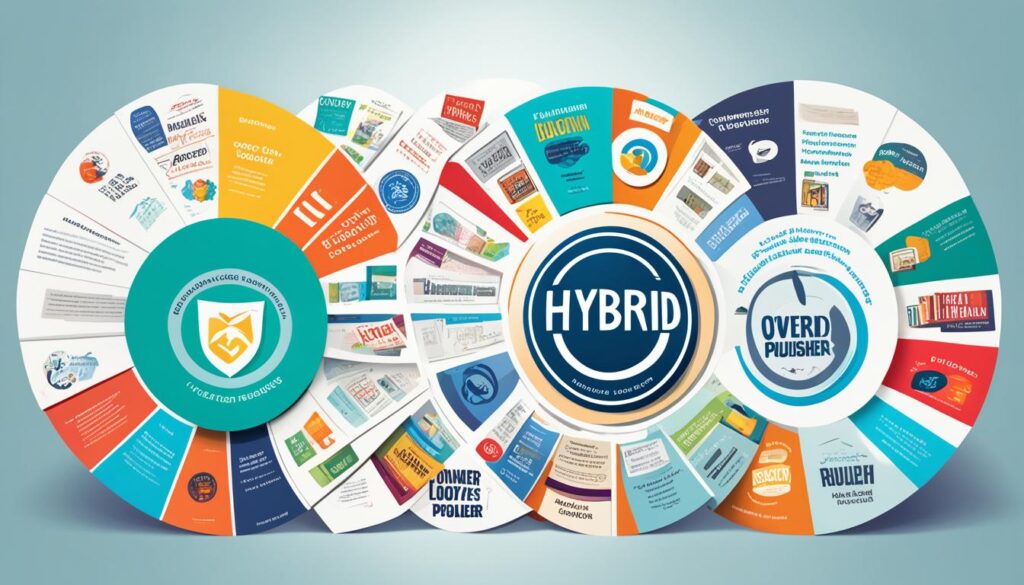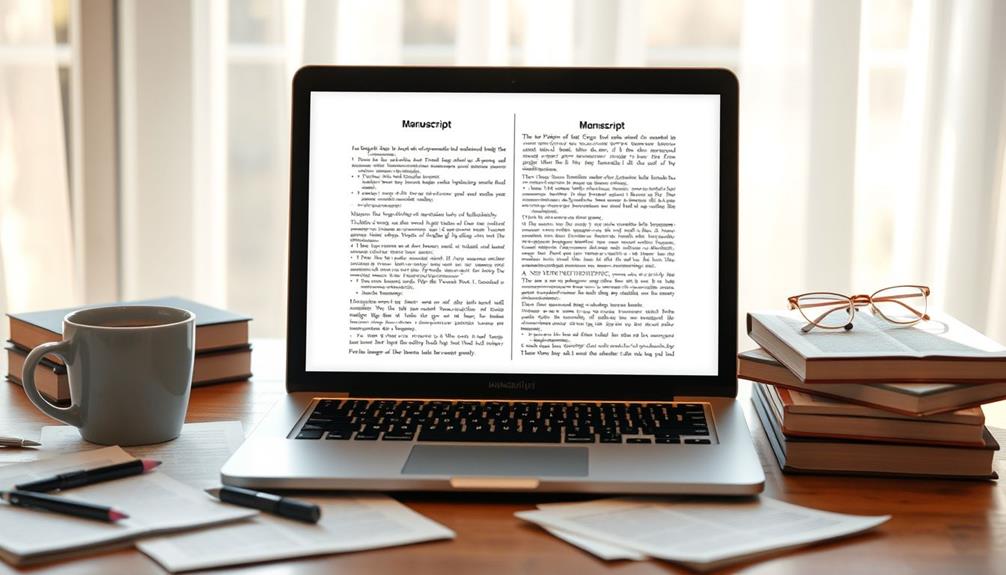ISBNs are special codes given to each book version. They help track, manage, and report book sales. In the U.S., you can buy ISBNs from Bowker’s My Identifiers program. But, some printing services give out free ISBNs.
If you’re writing and publishing your own book, this choice matters a lot. Having your own ISBN makes your book look more professional. It shows under your publishing name. If you use a free ISBN, your book is listed under the service that gave it. This might not look as good if you want to build a strong reputation.
So, should you buy your ISBN or take the free ones? We need to look at the benefits and drawbacks of each. Think about what you want for your book and the reputation you aim for.
Key Takeaways:
- ISBNs are unique identifiers assigned to each version of a book.
- Buying your own ISBN allows you to register your book under your chosen publishing company name, enhancing its professional image.
- Print-on-demand services may offer free ISBNs, but your book will be recorded as published by the entity that provided the ISBN.
- Consider your goals and the credibility you want for your book when deciding whether to buy your own ISBN or go for freebies.
- Working with a reputable hybrid publisher can be an alternative option that ensures book quality and credibility.
Pros of Buying Your Own ISBN
Buying your own ISBN offers many benefits for self-published authors. Let’s look into the advantages of having your own ISBN:
1. Establishing Your Own Publishing Company Name
When you purchase your own ISBN, you can create a publishing company name. This gives your book a professional look and builds your brand’s credibility. Your publishing company name makes your book more attractive to readers and professionals.
2. Increased Control over Publishing Details
Owning your ISBN means you control your book’s publishing details. You decide on distribution, marketing, and printing without constraints from others. This freedom lets you shape the publishing process to match your vision.
3. Enhanced Visibility for Bookstore Distribution and Media Exposure
Having an ISBN makes you the official publisher. This status can help with getting your book into bookstores. It also makes media outlets more likely to notice your book. This can mean more exposure and promotion for your book.
4. Freedom to Publish Multiple Books
If you’re thinking ahead to more books, buying ISBNs in bulk is a smart move. It’s cheaper than getting individual ISBNs for each book. This saves time and money, letting you focus on publishing more under your brand.
Getting your own ISBN has many perks that help maintain a professional and independent image as an author. The benefits of starting your own publishing company, having control, and getting better distribution and publicity are key to self-publishing success.
Now that we’ve looked at the pros of buying your own ISBN, we’ll examine the downsides in the next section.
Cons of Buying Your Own ISBN
There are some downsides to buying your own ISBN, especially concerning the costs. The biggest downside is the financial investment needed. ISBNs are pricey. For one ISBN, the price is $125. This can add up if you’re publishing many books or different editions.
For new authors or those with tight budgets, the cost of ISBNs can be a big obstacle. Spending money on ISBNs means less money for other important things. These include book production, marketing, and distribution. It’s crucial to think about your finances and long-term plans before buying ISBNs.
But, it’s critical to see the cost of an ISBN as an investment in your book’s success and credibility. Even with the upfront costs, owning your ISBN sets you up as a real publisher. It also gives you control over your publishing details.
Considerations for Cost-Effectiveness
If the cost of ISBNs is a concern, you have some options. For instance, using free ISBNs from print-on-demand services or Amazon can cut costs. This is especially helpful for smaller or personal projects.
Another choice is working with a reputable hybrid publisher. They might cover the ISBN costs in their book production package. This allows you to use their expertise without extra expenses.
Whether buying your own ISBN is a disadvantage depends on what you want from publishing, your budget, and how much you value having your publishing identity. Thinking about the pros and cons will guide you to a choice that fits your situation.
To show the financial differences between buying ISBNs and using free ones, look at this table:
| Type of ISBN | Cost | Usage Limitations |
|---|---|---|
| Buy Your Own ISBN | $125 per ISBN | No limitations on publishing identity and control |
| Free ISBN from Print-on-Demand Services | No monetary cost | The publishing identity is with the service provider |
| Free ISBN from Amazon (KDP) | No monetary cost | May affect bookstore distribution and future choices |
As the table shows, buying your ISBN lets you keep full control, but free ISBNs have restrictions. These can affect your publishing aims. It’s key to think about what matters most to you. Then, make a choice based on that.
The decision between getting your own ISBN or using a free one depends on your goals and needs. By weighing the pros and cons, you can decide what’s best for your book’s success.

Free ISBNs from Print-on-Demand Services
Self-publishing often means trying to save money. That’s why free ISBNs from services like Amazon’s Kindle Direct Publishing (KDP) and IngramSpark are so appealing. These options let authors get an ISBN without any cost. But, it’s vital to think about how a free ISBN might impact your book’s image in the industry.

Print-on-demand makes publishing easy and lets authors reach more people. Getting a free ISBN can save money upfront. Yet, using a free ISBN means your book is tied to the service that gave it to you. This could make people question if your work is professional.
Having your own publishing brand is key for recognition and trust in the industry. If you use a free ISBN, you might not get the chance to build this identity. Books and media might see your work differently if it’s not under your own brand.
Also, a free ISBN could limit where your book goes. Bookstores and libraries might avoid books with free ISBNs, thinking they’re not legit. This could keep your book out of physical stores, limiting your audience.
Think about the pros and cons of saving money versus how it affects your book’s image and reach. If you aim to build a respected brand and get your book widely distributed, buying your own ISBN might be a good move.
The Importance of Credibility
“Establishing trust and credibility is crucial in publishing. Readers, sellers, and reviewers look for professionally published works. A free ISBN might make them doubt your book’s quality, affecting its success.”
For authors, credibility is everything. You want your book to look professional and meet industry standards. Using a free ISBN could make people question its quality, affecting your book’s chances of success.
Buying your own ISBN shows you’re serious about your work. It sets up your own publishing identity, building trust with readers and professionals. It shows your commitment and values your readers’ trust.
To sum up, free ISBNs from print-on-demand services may look good for saving cash, but think about your book’s long-term image. Owning your ISBN helps you create a trusted brand and connects better with readers, sellers, and industry pros. Your choice should reflect your personal publishing goals and how you want to be seen in the industry.
Hybrid Publishers and ISBNs
If you’re thinking of self-publishing, consider a hybrid publisher. They manage the book production for you. They provide editing, cover design, formatting, and distribution services. Using a hybrid publisher means you can also use their ISBNs, which is a big plus.
ISBNs are special numbers that identify each book version. If your book has the hybrid publisher’s ISBN, it links to their respected name. This makes your book seem more credible in the book world. However, using the publisher’s ISBN means they also hold certain rights over your title, which could limit your control in some cases. On the other hand, acquiring your own ISBN numbers for books gives you complete ownership and flexibility when distributing your project. This allows you to maintain full creative and financial control, enhancing your independence as an author.
It’s vital to pick a well-respected hybrid publisher. Look for one that matches your book goals and has a history of success. Check their book list, client feedback, and any awards they’ve won.
Choosing to use a publisher’s ISBN is an option, not a must. Many hybrids let you use your own ISBN to keep full publishing control. What’s most important is teaming up with a trustworthy hybrid publisher. They can make your book better and more reliable.

Benefits of Working with a Hybrid Publisher:
- Professional book production services
- Option to use their ISBN for enhanced credibility
- Access to industry expertise and guidance
- Potential for wider distribution networks
- Opportunity to collaborate with experienced publishing professionals
Making Your Publishing Business Official
If you’re serious about your publishing business, it’s essential to make it official. You should register your business and get a business license and a DBA (Doing Business As) in your county. This is the first step to having a professional presence in the publishing industry.
Registering your publishing business brings many benefits that help it grow and succeed. One major benefit is being able to open a dedicated business checking account. This separates your personal and business finances, which is key for IRS rules and keeping accurate financial records.
Setting up your business officially also brings tax advantages. You can write off countless business-related expenses. These include book production costs, educational materials, conferences, and other professional events. These tax deductions can cut your tax bill and save you money.
But, remember, tax laws can be complicated. It’s wise to talk to a certified tax professional. They can help you understand your tax breaks as a publisher. They ensure you get every deduction you’re allowed.

By properly registering your business and getting the right licenses, you build a strong base for future success. This move boosts your credibility and lets you enjoy tax benefits and organized finances. If you’re set on growing your self-publishing business, making it official is a crucial step.
Using Amazon’s Free ISBNs
Amazon’s Kindle Direct Publishing (KDP) has a neat offer for authors who self-publish. They give out free ISBNs for print paperback books. This is great if you’re only publishing through Amazon or don’t expect many sales.
The free ISBNs let you use KDP’s easy platform to get your book out there. This makes it simpler to publish. You won’t have to buy or manage ISBNs yourself.
But, think about the downsides of Amazon’s free ISBNs. They might not work if you’re planning a book series or want your books sold widely. Using only Amazon’s ISBNs could limit you.
Bookstores and others might not want books with Amazon’s ISBNs. They could doubt the book’s worth outside of Amazon. Also, using these free ISBNs might make legal stuff tougher later on.
If you’re serious about publishing, weigh your options. Think about your long-term plans. Do you want to build a name in publishing? Might you work with others or try to get into bookstores? Consider all this.
Yes, Amazon’s free ISBNs are handy and open doors. Yet, it’s key to think about what they might mean for your book’s future. What’s good now might not be later.
Choosing an ISBN is a big step in publishing your own book. It affects how your book is seen and where it can go.

Comparing Amazon’s Free ISBNs with Purchased ISBNs
| Considerations | Amazon’s Free ISBNs | Purchased ISBNs |
|---|---|---|
| Cost | Free | Varies (typically $125 per ISBN) |
| Bookstore Distribution | Limitations and potential reluctance | Potential for wider distribution |
| Series or Imprint | May raise credibility questions | Establishes your own publishing brand |
| Long-term Publishing Goals | May limit potential collaborations and opportunities outside of Amazon | Greater flexibility and control |
Do E-books Require ISBNs?
When we talk about e-books, it’s not clear-cut if ISBNs are required. Many sources say that e-books don’t need ISBNs. But, it’s wise to look at what each platform you plan to use needs. Some places, like Draft2Digital, ask for a “ebook ISBN” that is 13 digits long.

If you are looking at using Draft2Digital or something similar, it’s key to check their rules. You need to find out if you have to get an ISBN for your e-book. Doing this homework will make sure you know what to do for your e-book.
If you already got a series of ISBNs, you might want to use them for your e-books. This helps keep your book branding consistent across all formats.
Considerations for Small-scale or Personal Projects
If you’re diving into a project for fun or aiming small, you might not need to buy an ISBN. Using a free one or one from Amazon can save you money. Think about your project’s goals, who you want to read it, and your budget. If you’re not looking to reach a lot of people or make a brand, a free ISBN might be all you need.
| Scenario | Recommended ISBN option |
|---|---|
| Your book is a personal project or for fun | Free ISBN or platform-provided ISBN |
| Your book targets a small audience | Free ISBN or platform-provided ISBN |
| Your primary goal is cost-effectiveness | Free ISBN or platform-provided ISBN |
| You don’t require widespread distribution | Free ISBN or platform-provided ISBN |
Choosing a free or given ISBN lets you use your money wisely. It helps without hurting your project’s quality. Always consider your personal goals and what you hope to achieve as an author. This will help you decide on the best approach to ISBNs for your work.
Even for personal projects, aiming for quality is crucial. Think about your book’s cover, editing, and how to market it. These can make your book more appealing and professional.
The decision to use an ISBN depends on your project’s nature and goals. Consider your audience, sales hopes, and budget. This will help you pick the most effective and right option for your work.

Uploading E-books Without ISBN on Draft2Digital
Self-publishing e-books might cause you to run into problems when uploading them to Draft2Digital without an ISBN. Even though you’ve heard that e-books don’t really need ISBNs, some places in Draft2Digital still ask for them.
If you’re struggling to upload your e-book on Draft2Digital because it lacks an ISBN, don’t worry. It’s a good idea to talk to their support team. They can help you understand what to do.
Having a bunch of ISBNs can be useful if you’re publishing multiple books. When you assign them to your e-books, it can help with publishing on different platforms, like Amazon. This makes everything smoother and helps get your books out there.
Amazon Listings and E-book Distribution
Getting your e-books listed on Amazon is key to boosting their visibility and sales. Amazon gives out free ISBNs, but think about if that’s what you really want for your books.
If you’re not planning big sales or you’re publishing just one book, Amazon’s free ISBNs could work for you. But there are things to consider before you decide.
Some bookstores might not want books with Amazon’s ISBNs. They might think these books aren’t professionally published. Also, if you’re planning more books or a series, Amazon’s ISBNs might limit your options later.
“For self-published authors seeking broader distribution and a competitive edge in the publishing industry, it’s crucial to carefully weigh the benefits and drawbacks of using Amazon’s free ISBNs.”
Think about your long-term goals before using Amazon’s free ISBNs. If you want your book to reach beyond Amazon, getting your own ISBNs or exploring other options might be better.
ISBN Requirements for E-book Distribution Platforms
| E-book Distribution Platform | ISBN Requirement |
|---|---|
| Draft2Digital | Some distribution channels may require an ISBN |
| Amazon Kindle Direct Publishing (KDP) | Free ISBN available, but potential limitations exist for wider distribution |
| Other platforms (Smashwords, Barnes & Noble Press, etc.) | ISBN may not be required |
You need to know the ISBN rules for each e-book platform you use. Doing your homework on ISBNs helps you make smarter choices for your e-books.
The decision to use an ISBN on Draft2Digital depends on your situation and goals. Think about what you want for your e-book and the rules of different places to decide what’s best for your book.

Additional Resources:
- Draft2Digital – Learn more about Draft2Digital’s e-book distribution services and support.
- KDP Help: Amazon’s ISBN Requirements – A comprehensive guide to ISBN requirements when publishing with Amazon KDP.
- Book Launch: Getting Your Publishing ISBN Numbers for Free – A helpful resource for understanding the pros and cons of using free ISBNs from different platforms.
Making an Informed choice
Self-publishing requires making informed choices. You must decide if you’ll buy an ISBN or use a free one. This depends on your goals, budget, and plans for the future.
Having your own ISBN boosts your book’s credibility. It lets you build your own brand. Plus, you control your book’s publishing details, ensuring you’re listed as the publisher officially.
But, consider the cost. ISBNs are pricey, especially for multiple books or editions. For new authors or those on a tight budget, this might be too much.
If your project is small or personal, free ISBNs from places like Amazon could work. They keep your costs low but still allow you to publish.
The ISBN choice affects how serious your book is taken in the industry. Buying one could be crucial for a strong publishing image. For personal projects or books unlikely to sell much, free ISBNs can save money.
The choice between buying an ISBN or getting a free one hinges on your needs and dreams as a self-publishing author.
Conclusion
Choosing to buy your own ISBN or use free ones is a big decision in your self-publishing journey. It depends on what you aim for, how much you can spend, and how you plan to share your book.
Getting your own ISBN helps you to build your own publishing identity and control your book’s details. But, it costs money, which might be tough for authors on a tight budget. On the other hand, free ISBNs from services like Amazon can help save money. They’re good for smaller or personal projects.
The choice needs to match your situation and goals as a self-published author. Think about the image and trust you want your book to have. Also, consider how much you’re willing to spend. Whether you buy an ISBN or get a free one, the key is to choose wisely for your needs.
FAQ
Should You Buy Your Own ISBN or Choose Freebies?
What are the pros of buying your own ISBN?
What are the cons of buying your own ISBN?
Can you get free ISBNs from print-on-demand services?
Can hybrid publishers provide ISBNs?
How can you make your publishing business official?
Do Amazon’s free ISBNs have any limitations?
Do e-books require ISBNs?
Are ISBNs necessary for small-scale or personal projects?
What if there are issues when uploading e-books without an ISBN on Draft2Digital?
How can you make an informed choice regarding ISBNs?
Source Links
- https://archive.blogs.harvard.edu/lamont/2021/06/16/publishing-on-amazon-kdp-use-a-free-isbn-or-pay-bowker/
- https://nonfictionauthorsassociation.com/should-you-buy-your-own-isbn-or-use-a-free-isbn-important-advice-for-self-published-authors/
- https://www.writingforums.com/threads/amazons-free-isbns.202609/









